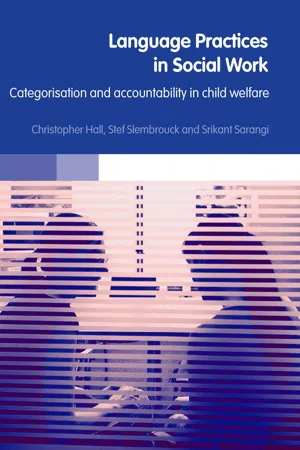
Language Practices in Social Work
Categorisation and Accountability in Child Welfare
- 202 pages
- English
- ePUB (mobile friendly)
- Available on iOS & Android
Language Practices in Social Work
Categorisation and Accountability in Child Welfare
About This Book
Analysis of language and discourse in social sciences has become increasingly popular over the past thirty years. Only very recently has it been applied to the study of social work, despite the fact that communication and language are central to social work practice.
This book looks at how social workers, their clients and other professionals categorise and manage the problems of social work in ways which are rendered understandable, accountable and which justify professional intervention. Features include:
- studies of key practice areas in social work, such as interviews, case conferences, home visits
- analysis of the language and construction used in typical case studies of everyday social work practice
- exploration of the ways in which professionals can examine their own practice and uncover the discursive, narrative and rhetorical methods that they use.
The purpose of this engaging study is to increase awareness of language and discourse in order to help develop better practice in social work. It is essential reading for professionals in social work, child welfare and the human services and will be a valuable contribution to the study of professional language and communication.
Frequently asked questions
Information
1Introduction
So it’s mayhem up there
Social worker on the phone
Meeting between social worker and doctors
Meeting in social work office
Commentary to camera
Social worker on the phone to police
Commentary to camera
Commentary to camera
Meeting with police
Social worker on the phone
Planning in social work office
Meeting with police
Table of contents
- Cover
- Half Title
- Title Page
- Copyright Page
- Table of Contents
- Acknowledgements
- 1 Introduction
- 2 Categorisation and accountability in professional texts and talk
- 3 Collegial communication in policy review interviews
- 4 Inter-professional decision-making in a case conference
- 5 Negotiating roles in a home visit
- 6 Reporting events in case notes
- 7 Parents’ accounts of social work
- 8 Justifying action in a public inquiry
- 9 Narrative transformation in media reporting
- 10 Conclusion
- Appendix 1
- Appendix 2
- Notes
- Bibliography
- Author index
- Subject index